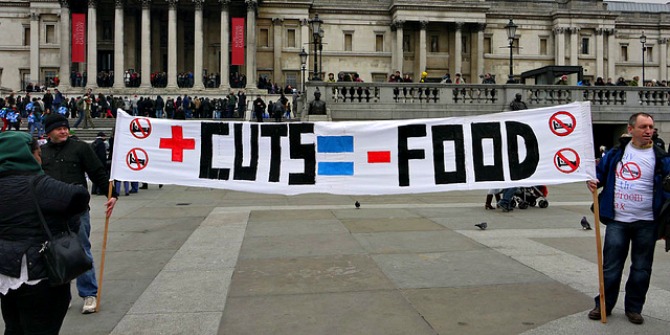 With the rich getting richer and the poor getting poorer, and with socialist parties around Europe fighting only for national attention, is there hope for an international left? Lea Ypi writes that, more than ever, the world has to be made by those sceptical of capitalism. She makes the case for rebuilding international solidarity.
With the rich getting richer and the poor getting poorer, and with socialist parties around Europe fighting only for national attention, is there hope for an international left? Lea Ypi writes that, more than ever, the world has to be made by those sceptical of capitalism. She makes the case for rebuilding international solidarity.
At the 2018 World Economic Forum in Davos, Google’s CEO responded to criticism about tax avoidance in the EU by arguing that his company was “happy to pay a higher amount, whatever the world agrees on as the right framework”. The trouble is that there is no such thing as the world, and no such thing as an agreement when it comes to how wealth is distributed. There are private companies who gain through profits and there is a public sector that loses through cuts. The rich get richer and the poor get poorer.
The UK, one of Europe’s most affluent states, is on the verge of collapse: child poverty, hunger, rough sleeping are all on the rise. That was the case in the past too. But in the past, losers had figured out two things. The first was that the great means of production had to be democratically controlled. The second was that one had to be internationally organized to hold the winners to account.
Google and Facebook are the 21st century equivalent of textile and coal factories. But where is the battle cry of the international left for their democratic control? Now one has to wait for Google to say: “tax us”. One has to wait for George Soros to remind capitalism of its responsibilities to future generations. One has to wait for “le président des riches” (as Macron was recently called) to kindly ask his friends to share their wealth.
Capitalism is capitalism as much as it used to be. It is transnational as much now as in the past. And it is in crisis, a crisis of production but importantly also of values, and arguably one of the worse in its history. One does not need to wonder whether any of this is still true: the capitalists have been telling us for quite some time. But anticapitalism can’t even find a name for itself. And international coordination seems to be nobody’s priority.
Even when not playing catch with populists on how to make migrants’ life harder, the left is in perpetual self-interrogation mode. Of course there are exceptions. Like the current Labour party, willing to take on capital with a clear anti-austerity message and reaping the benefits of that message to everyone’s surprise. But even there, the best outcome one seems to hope for is (serious) social democracy in one country. Yet British workers cannot save themselves if German workers are doomed. And if German workers win at the expense of Greek ones, all remain losers and the crisis is only postponed. Neither loss will turn into a gain, however many fences and walls one builds around one’s borders.
Capitalism has no borders and neither should labour. Capitalists are united and so should anticapitalists be. The left needs to rediscover its cosmopolitan roots and build a new International. Of course, times have changed. But have they changed so much?
Both the First and Second International mobilized around issues that were strikingly similar to the ones we seem to find no answers for today: the importation of cheap labour, the effects of foreign workers on national labour organisation, the critique of imperialism linked to the process of dislocation of capital, exploitation in the workplace, shorter working days, and the fight for women’s rights. None of these questions has been resolved. But they are international questions, now as they were before.
And yet, socialist parties around Europe seem resolved to continue competing for national attention. That can only be a limited first step. They should call for shared rallies, shared days of strike, a shared constituency. They should construct the same electoral programme and build shared electoral platforms. They should call together for Europe-wide taxation and ultimately much more. They should challenge capitalism as a system and challenge it internationally.
Forget what Google tells you, the winners will not give away anything just because they were asked. And there is no world out there that will agree on anything. The world has to be made by those sceptical of capitalism. They have to coordinate, mobilise, and fight internationally. Now, as in earlier times, capitalism gives us a name for that fight and the means to conduct it. It gives us instant messaging and social networking, the tools which make rebuilding a world of international solidarity easier than ever before. But capitalism will not give us the will to fight it. It cannot make a shared world for us or pretend that it is already out there.
______
 Lea Ypi is Professor of Political Theory at the LSE. She is the author of Global Justice and Avantgarde Political Agency (Oxford University Press 2011) and (with Jonathan White) of The Meaning of Partisanship (Oxford University Press 2016).
Lea Ypi is Professor of Political Theory at the LSE. She is the author of Global Justice and Avantgarde Political Agency (Oxford University Press 2011) and (with Jonathan White) of The Meaning of Partisanship (Oxford University Press 2016).
All articles posted on this blog give the views of the author(s), and not the position of LSE British Politics and Policy, nor of the London School of Economics and Political Science. Featured image: World Economic Forum (Flickr; CC BY-NC-SA 2.0).








Oh dear. Here we go again. A long struggle to rid ourselves of democracy in order to try and get rid of market economics, while we are swopping one crew of shysters for another. One hundred years on, apply the same remedy. One Wolfgang Streeck, never heard of him till I bought one of his books a week back, has been saying for years, apparently, that capitalism is destroying itself. Soon, we will start hearing and reading about the solution. This will be the same system but with a different name and non-stop barrage of new narrative under the headings of analyses, comment, support and spruiking by the millions of carpet-baggers jostling to be heard. We have an international kleptocratic oligarchy. The Left has never been able to beat it. The Left just join it or support it hoping for a place on the gravy train: politics, bureaucracy, mainstream media, academia, business, the Arts, education, etc., the Left will never bite the hand which looks after them so well.
Would the professor care to pay more attention to the evidence?
Socialism may have some fine ideas about sharing out the fruits of economic activity, but it has consistently proved to be useless at actually producing those fruits. When you confront socialists with examples of its failure (the Soviet Union, Venezuela, etc), they say that was not real socialism or that socialism did not have a chance to develop. If that is so, where is the evidence that socialism does work? Capitalism, by contrast, manifestly has worked.
To take a specific example, the proportion of the world’s population in extreme poverty (the 1.9 dollars a day level as it now is) has fallen from 40 per cent to 10 per cent over the last 40 years or so. Capitalism and free trade have had a lot to do with that.
As for the claim that the country is on the point of collapse, look around you and you will see that the claim is false.
We do not challenge capitalism as a system by opting to reform it via taxation. Capitalisms twin concomitants of poverty, relative or absolute and war by deed or proxy are inevitable consequences of competitive production for sale with a view of realising a profit for the parasite class ,(5-10%) at the expense of a wage enslaved majority working class (90-95%).
The reproduction of poverty, in order to keep a disadvantaged social class ever willing to seek employment, to be further exploited of their surplus value over and above their rations (wages), is as essential for tjhe maintainance of the capitalist class, as when Voltaire penned his philosophical aphorism, “The comfort of the rich is dependant upon an abundant supply of the poor.”
The challenge to capitalism will not spring from the activities of self styled revolutionaries, who seek ot govern OVER workers in some enlightened despotic version of capitalism, but is a revolutionary one which has to be the will and action of the immense majorty, convinced in themselves, as a class for themselves, that the last great emancipation is of the wage slaves, to abolish the wages system and establish a commonly owned , production for use ,free access global society without elites, governmment over them, administerd by us all, in conditions of delegatory democracy.
I see a flaw, a basic flaw.
Clearly, whatever ‘capitalism’ is, it is not what it once was;As the quote from Soros points-up.
While the left clamours for relevance on the tiniest of stages, it’s profound avoidance of relevance in the wider-world signals its downward trajectory. A direction of travel that the above misreading of the 2017 election can do nothing to alter.
Why not take the advice of George Soros and recommit to having Democratic oversight of Global trade and financial transactions? After all, that ball is already rolling.
One last point: Yes, the ‘Googles’ of this world can be taken at their word, their stated willingness to pay what is (actually) asked of them represents no loss in a; as yet mythical, level playing field of pan-national trade. Alas, the fly in that ointment is the lower strata of wealthy individuals;who are those attracted to a certain form of Party Politics – to play a part in it themselves, or to do so by proxy. It is the scheming of this group that sustains the status quo of financial inequality.